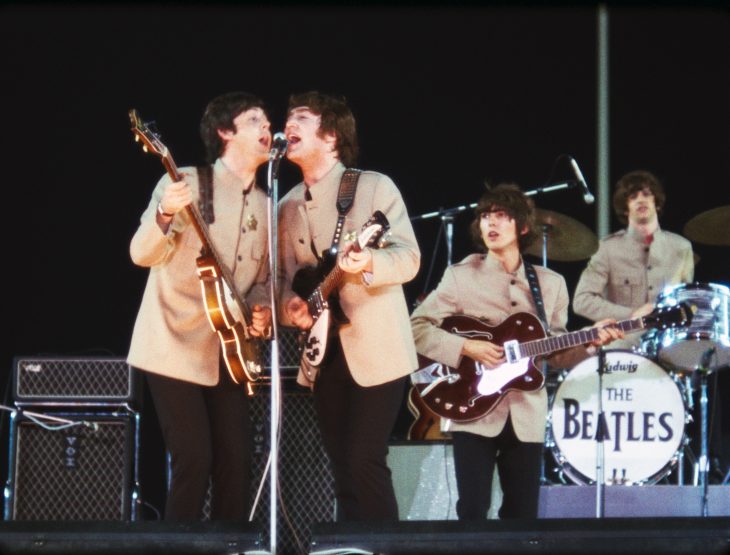This past Thursday night I attended the sold-out opening screening of “Eight Days A Week” – director Ron Howard’s ode to The Beatles that focuses primarily on their touring years, from 1962-1966.
It is hard now not to think of The Beatles as anything other than a phenomenon – Beatlemania! – and an iconic force of musical nature. They were all of those things, but what this movie so effectively reminds us – as John Lennon famously said somewhere in the “Beatles Anthology” – is that they were “just a band.”
But oh my, what a band…
With vintage photos and film clips from the late 1950s and early 60s, “Eight Days A Week” shows us four guys who grew up together (OK, maybe not so much Ringo, who joined The Beatles just as they started their recording career, but he shared their scrappy Liverpool origins). It was essentially John’s band from the beginning, but part of his gift was his ability to recognize in Paul and George talent and ambition equal to his own.
The mission of the documentary is to trace the full arc of their years as a touring band: from the clubs of Hamburg were their sound was forged, to the Cavern Club in Liverpool where they found their audience, and eventually around the world, where their concerts were drowned out by screaming fans. Throughout the arc we are watch as the role “pop music” in the cultural firmament is transformed in front of our eyes and ears.
But the full power and sheer artistry of The Beatles is more fully conveyed in the 30 minutes of concert footage that follows the documentary.
Here are The Beatles in a truly epic setting: Shea Stadium in New York – the first performance of their final tour in 1966. They dash out on the field and climb atop a stage that looks like a boxing ring erected over second base, in the middle of the vast expanse of a baseball field, 50 yards away from the nearest fan, some 56,000 of whom are screaming their heads off through the entire show.
Still, you can’t help but be impressed with the quality of the performance. The set includes both covers and originals, opening with “Twist and Shout” and ending with “A Hard Day’s Night” and “Help.” Showing the complete concert after the documentary is its own tour-de-force; it reminds us what the phenomenon was really about: the sheer power of skilled musicianship, the intensity of accomplished artistry.
The documentary is a 90 minute setup; the concert footage is a 30 minutes payoff – the undeniable proof of everything postulated in the film.
Ron Howard’s film also reminds us just how much “Beatlemania” was a reflection of the times. In America especially, The Beatles arrival in February 1964 was the medicine a grieving nation needed after the shock of the Kennedy assassination. Their appearances on The Ed Sullivan Show carved the opening cracks in what would eventually become the “Generation Gap.” We are reminded of the tumultuous history that The Beatles were part of, from the conflagration in Vietnam to the Civil Rights movement.
One detail in the documentary that surprised me addressed the matter of race as it is uniquely experienced in America: The Beatles had a clause in their contracts that declared that they would not play for segregated audiences. A voice over from Paul McCartney explains how foreign the whole idea of segregation and Jim Crow was to their experience in England.
Howard deftly gives all four Beatles nearly equal screen time for retrospective commentaries. The surviving Beatles, Paul and Ringo, appear on screen several times in their current incarnations; There are equal amounts of archival footage of John and George looking back on their years as Beatles. Their commentaries lend a “Rashomon” like perspective to the whole experience.
The Beatles 1966 tour ushered in the era of the stadium concert – despite technology woefully suited for the purpose; George explains how Vox built amplifiers especially for this tour: “I think they were a hundred watts…” – and much of the audio was piped through the crackly stadium PA system: “Now playing at second base… The Beatles!”
I think it was Ringo who described the aftermath of what would history would record as The Beatles final live performance, the last concert of the 1966 tour at Candlestick Park in San Francisco: After the show the band was raced out of the stadium grounds in what Ringo describes as “a meat wagon” – a bare metal armored police wagon, the kind that ferries convicts to prisons. It was pretty much within those lurching steel confines that all four Beatles decided “we’re not going to do this any more…”
Freed from the demands of a touring schedule, The Beatles dedicate themselves to the studio. There is footage from the EMI studio at Abbey Road of audio tape loops strung between tape machines… and then there is “Sergeant Pepper.”
From there the documentary quickly traces the remainder of The Beatles recording career: 5 albums in three years, from “Magical Mystery Tour” to the “White Album,” “Abbey Road” and the “posthumously” released “Let It Be” (which was released after the band announced its demise early in 1970).
The movie ends with the most footage I have ever seen from The Beatles last-ever ‘concert’ – that day in January 1969 when they set up on the roof of the Apple Corps headquarters in London and played to the people on the street below. It’s more than three years since the last time they performed “live” together, and the footage proves, once and for all that The Beatles were still, and always were, a great fucking band.
*
“Eight Days A Week Is” playing at The Belcourt. Info and tickets here. It will also be released to streaming video via Hulu next week. A subscription will be required. So go see it in a theater with good surround sound.

